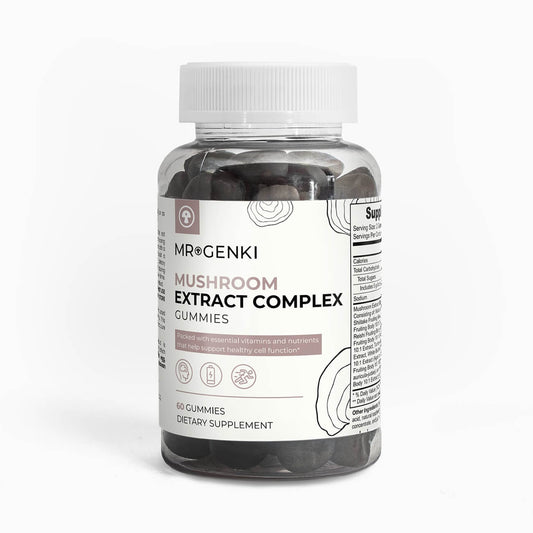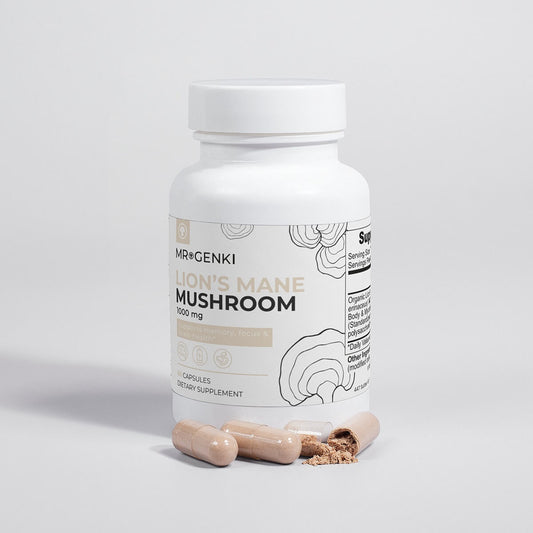Key Takeaways
| Key Point | Detail |
|---|---|
| What is Lion's Mane Mushroom? | A traditional medicinal mushroom with cognitive and immune-boosting properties |
| Health Benefits | Enhances brain function, may benefit ADHD and anxiety, supports the immune system, potential effects on testosterone |
| Dosage and Consumption | Recommendations on how to incorporate Lion's Mane into your diet safely |
| Pregnancy and Lion's Mane | Safety considerations and expert opinions |
| Incorporating in Diet | Ideas and recipes for including Lion's Mane in meals |
You've probably heard of Lion's Mane mushroom, a natural wonder in the world of health and wellness. But what exactly makes this mushroom so special? This guide delves deep into the heart of Lion's Mane, exploring its benefits, uses, and the science behind why it's becoming a staple in health-conscious communities.
What is Lion's Mane Mushroom?
Lion's Mane Mushroom, or Hericium erinaceus, stands out in the fungal kingdom with its unique, shaggy appearance resembling a lion’s mane. This mushroom isn't just captivating in looks; it carries a rich tapestry of history and an array of current uses that make it a fascinating subject in both traditional and modern contexts.
Historical Significance and Traditional Uses:
Historically, Lion's Mane Mushroom has been a cornerstone in traditional medicine across various cultures, particularly in Asia.
In ancient China, it was revered not only as a gourmet food but also as a powerful medicinal mushroom.
Traditional Chinese Medicine practitioners have long used Lion's Mane for its purported properties in improving digestive health, strengthening the nervous system, and even as a tonic for longevity and spiritual potency.
In Japan and other East Asian countries, Lion's Mane was not only consumed for its health benefits but also appreciated in culinary traditions for its seafood-like flavor, often being used as a substitute for meat or fish by Buddhist monks.
Modern Uses and Popularity:
In the contemporary wellness landscape, Lion's Mane has transitioned from ancient remedy to a modern superfood. Its uses have expanded, thanks in part to growing scientific interest and the global health and wellness movement. Today,
Lion's Mane is celebrated for its potential cognitive-enhancing properties. It's being researched for its possible neuroprotective effects, making it a subject of interest in the study of neurodegenerative diseases like Alzheimer's and Parkinson's.
Beyond brain health, Lion's Mane is also gaining popularity for its possible benefits in mental health, particularly in managing symptoms of anxiety and depression. Its natural anti-inflammatory and antioxidant properties make it a sought-after natural supplement for overall wellness.
The mushroom is now widely available in various forms - from raw, cooked forms in gourmet dishes to extracted forms in dietary supplements. Its adaptability in both cuisine and health supplementation has led to its growing popularity among health enthusiasts, chefs, and researchers alike.
Health Benefits of Lion's Mane Mushroom
The growing interest in Lion's Mane Mushroom is largely due to its diverse health benefits, each backed by both traditional knowledge and modern science. Here's a closer look at each of these benefits:
-
Cognitive Health and Brain Function: One of the most celebrated benefits of Lion's Mane is its potential to enhance cognitive functions.
Research indicates that compounds in Lion's Mane, such as hericenones and erinacines, may stimulate the growth of brain cells and improve the functioning of the hippocampus, a region of the brain involved in processing memories and emotional responses.
This suggests potential benefits in improving memory, concentration, and possibly even offering a protective effect against cognitive decline associated with aging. -
Mental Health - ADHD and Anxiety: The potential mental health benefits of Lion's Mane are particularly intriguing. For individuals with ADHD, Lion's Mane may offer a natural aid in improving focus and reducing impulsivity.
The mushroom's bioactive compounds are believed to support brain health, which could be beneficial in managing ADHD symptoms.
Moreover, its natural anxiolytic effects suggest a calming influence on the nervous system, making it a promising supplement for those dealing with anxiety.
These benefits stem from Lion's Mane’s ability to modulate neurotransmitter levels, thus potentially easing symptoms of anxiety and depression. -
Immune System Support: Lion's Mane doesn't just work wonders for the brain; it's also a powerful immune booster. The mushroom contains polysaccharides, like beta-glucans, which are known for their immune-modulating effects.
These compounds can enhance the body's immune response, helping to fight off pathogens and reduce inflammation. This makes Lion's Mane a valuable ally in maintaining overall health and resilience against illnesses. -
Potential Influence on Testosterone Levels: Emerging research is exploring the relationship between Lion's Mane and testosterone levels.
While the evidence is still in its early stages, some studies suggest that the mushroom may have a role in hormonal health, potentially influencing testosterone levels.
This aspect of Lion's Mane research is particularly interesting in the context of men's health, offering a natural avenue to explore for balancing hormones.
Each of these benefits highlights Lion's Mane Mushroom's versatility as a natural supplement. Its unique blend of cognitive, mental, immune, and potential hormonal health benefits make it an intriguing subject for further research and a valuable addition to your holistic health journey.

Lion's Mane and Modern Science
Recent studies are providing a scientific basis for the traditional uses of Lion's Mane. From enhancing neurogenesis to potentially aiding in neurodegenerative diseases, the scope of research is broad and promising.
Dosage and Consumption
How much Lion's Mane should you take? While there's no one-size-fits-all answer, most studies use dosages ranging from 250 mg to 3 g per day. It's available in various forms, including supplements and powders.
Remember, the best dosage for you may depend on several factors, including your health status and goals.
Lion's Mane Mushroom and Pregnancy
When it comes to pregnancy, the safety and health of the mother and developing baby are of utmost priority. Lion's Mane Mushroom, while celebrated for its health benefits, poses a question for pregnant women: is it safe to consume during pregnancy?
While there is a lack of extensive research specifically on Lion's Mane Mushroom during pregnancy, historical use and anecdotal evidence suggest that it is generally safe.
This adaptogenic mushroom has been consumed for centuries and is believed to be beneficial not only for pregnant women but also for a broader audience due to its health properties.
Benefits During Pregnancy:
- Nutritional Value: Lion's Mane contains significant amounts of Vitamin B12, crucial for overall health and particularly important in pregnancy for both the mother and the developing fetus.
- Weight Management: For those looking to manage their weight during pregnancy, Lion's Mane might act as an appetite suppressant and has been linked to anti-obesity effects in some studies.
-
Gestational Diabetes: Lion's Mane may have a hypoglycemic effect, which could be beneficial in managing or preventing gestational diabetes by regulating blood sugar levels.
Breastfeeding Considerations:
While there are no specific studies on Lion's Mane's effects during breastfeeding, there is no current reason to suspect that it could be harmful. In fact, the anti-anxiety properties of Lion's Mane could potentially benefit breastfeeding mothers by reducing anxiety levels, which have been linked to improved breastfeeding experiences.
Mushroom Coffee During Pregnancy:
Mushroom coffee, often containing Lion's Mane, is generally considered safe during pregnancy. However, it's important to be mindful of the caffeine content and limit intake accordingly. Adaptogens like Lion's Mane in mushroom coffee can have energizing properties, which should be considered in relation to sleep patterns.
Consultation with Healthcare Professionals:
Given the lack of extensive research, it's always advisable for pregnant women to consult with a healthcare provider or a nutritionist specializing in prenatal nutrition before adding Lion's Mane Mushroom to their diet. This ensures personalized advice considering individual health circumstances.
In summary, while Lion's Mane Mushroom holds potential benefits during pregnancy and breastfeeding, due to the limited research in these specific areas, it's essential to approach its use with caution and under professional guidance.
Incorporating Lion's Mane into Your Diet

Integrating Lion's Mane Mushroom into your diet is not only beneficial for your health but can also be a delightful culinary adventure.
This versatile mushroom can be consumed in various forms, each offering its unique benefits and flavors. Here’s how you can incorporate Lion's Mane into your daily routine:
-
Cooking with Fresh or Dried Lion's Mane: Fresh Lion's Mane mushroom has a meaty texture and a flavor reminiscent of seafood, making it a popular meat substitute in vegetarian and vegan dishes. It can be sautéed, grilled, or added to soups and stews. If fresh Lion's Mane is not available, dried versions can be rehydrated and used similarly in recipes. This not only adds a unique flavor to your dishes but also ensures you reap its health benefits.
-
Lion's Mane Supplements: For those looking for a convenient way to include Lion's Mane in their diet, supplements are a great option. Available in the form of capsules, powders, or tinctures, these supplements are designed to provide a concentrated dose of the mushroom’s beneficial compounds. They are especially useful for those seeking specific health benefits like cognitive enhancement or mental health support.
-
Lion's Mane Teas and Coffees: A trendy and enjoyable way to consume Lion's Mane is through infused teas and coffees. These beverages often combine the mushroom extract with other beneficial herbs and ingredients, offering a comforting and health-boosting drink. They can be a great addition to your morning routine or a relaxing beverage in the evening.
-
Adding Lion's Mane to Smoothies and Breakfast Bowls: Powdered Lion's Mane can be easily added to smoothies, oatmeal, or yogurt bowls. This not only enhances the nutritional value of your breakfast but also ensures you start your day with a cognitive boost.
-
Lion's Mane in Baking: Incorporating Lion's Mane powder into baked goods like muffins, bread, or energy bars is another creative way to include this superfood in your diet. It adds a nutritious twist to your favorite recipes without altering the taste significantly.
Recipe Ideas:
CREDIT: Aubrey's Kitchen
-
Lion's Mane Veggie Stir-Fry: Sauté fresh Lion's Mane mushrooms with a mix of colorful vegetables, garlic, and soy sauce for a quick and nutritious meal.
-
Lion's Mane and Herb Frittata: Incorporate chopped Lion's Mane into your egg frittata for a brain-boosting breakfast or brunch.
-
Lion's Mane Smoothie: Blend Lion's Mane powder with bananas, berries, almond milk, and a spoonful of honey for a refreshing and healthful drink.
- Sautéed lion's mane mushrooms with ghee, tamari, and garlic: This simple yet delicious recipe enhances the umami flavor of the mushrooms as they caramelize to a deep brown.
-
Lion's mane mushroom recipe with butter, garlic, and thyme: This beginner-friendly recipe sautés lion's mane mushrooms in a mixture of butter, garlic, and thyme, creating a flavorful and satisfying dish.
-
Crispy sautéed lion's mane mushrooms with garlic and herbs: This recipe uses a basic cooking technique to create a crispy exterior on the mushrooms, which are then seasoned with garlic and herbs for a delicious and textured dish.
-
Lion's mane mushroom pizza topping: Lion's mane mushrooms can be sautéed and used as a pizza topping, adding a unique and flavorful twist to your pizza.
-
Lion's mane crab cakes: These vegan "crab cakes" are made from shredded lion's mane mushrooms and can be marinated in a mix of jalepeno, garlic, orange juice, cumin, oregano, and onion before being baked in the oven and crisped up on a griddle.
-
Lion's mane mushroom "steaks" served over mashed potatoes: This recipe involves cutting lion's mane mushrooms into thick slabs, sautéing them in a mixture of butter and oil, and serving them over mashed potatoes with a rich gravy
Remember, when adding Lion's Mane supplement to your diet, it's important to start with smaller doses and gradually increase to see how your body reacts.
Side Effects of Lion's Mane Mushroom
While Lion's Mane Mushroom is celebrated for its numerous health benefits, it's important to be aware of potential side effects, especially when consumed in supplement form or in large quantities. Here's what you should know about the possible side effects:
-
Digestive Issues: In some cases, Lion's Mane supplements or extracts can cause digestive upset, including bloating, diarrhea, or stomach discomfort.
This is often due to the high fiber content in mushrooms or the body's adjustment to the supplement. -
Blood Sugar Levels: Lion's Mane has been shown to lower blood sugar levels, which is generally considered a benefit, especially for those with diabetes.
However, for individuals on blood sugar-lowering medications, this could potentially lead to hypoglycemia. Monitoring blood sugar levels and consulting with a healthcare provider is advised. -
Interaction with Medications: As with many supplements, there is a potential for Lion's Mane to interact with certain medications.
This includes medications for diabetes, blood thinners, or any drugs that affect the immune system. It's crucial to consult a healthcare professional before starting Lion's Mane if you are on any medication. -
Pregnancy and Breastfeeding: Due to limited research on Lion's Mane during pregnancy and breastfeeding, as mentioned earlier, caution is advised.
Pregnant or breastfeeding women should consult a healthcare provider before adding Lion's Mane to their diet.
It's important to note that most people who consume Lion's Mane Mushroom do not experience severe side effects. The key is moderation and being attentive to your body's reactions.
Starting with a lower dose and gradually increasing it can help minimize potential adverse effects and allows you to monitor how your body responds to the mushroom.

FAQs: Common Questions About Lion's Mane Mushroom
-
What is Lion's Mane Mushroom and what does it look like? Lion's Mane Mushroom, scientifically known as Hericium erinaceus, is a unique, white, globe-shaped fungus with long, shaggy spines. It resembles a lion’s mane as it grows, hence its name.
-
What are the primary health benefits of Lion's Mane? The primary benefits include enhancing cognitive functions, supporting mental health, boosting the immune system, and potentially influencing testosterone levels.
-
How does Lion's Mane support brain health? Compounds in Lion's Mane, like hericenones and erinacines, are believed to stimulate the growth of brain cells and improve brain function, potentially aiding in memory, focus, and preventing cognitive decline.
-
Can Lion's Mane help with ADHD and anxiety? Yes, there is growing interest in using Lion's Mane for mental health, particularly ADHD and anxiety, due to its potential to enhance focus and exert a calming influence on the nervous system.
-
Is Lion's Mane safe to consume daily? Generally, Lion's Mane is considered safe for daily consumption. However, it's important to follow recommended dosages and consult with a healthcare professional if you have underlying health conditions or are taking medications.
-
How should I take Lion's Mane, and in what dosage? Lion's Mane can be taken in various forms, including raw, cooked, as a supplement, or in teas and coffees. Dosages in studies range from 250 mg to 3 g per day, but the ideal amount can vary based on individual needs and health goals.
-
Are there any side effects of consuming Lion's Mane? While generally safe, some people may experience mild digestive upset, allergic reactions, or interactions with certain medications. It's advisable to start with a lower dose and consult a healthcare provider if you have concerns.
-
Can Lion's Mane be used in cooking? Absolutely, Lion's Mane can be cooked and enjoyed like other mushrooms. It has a meaty texture and a flavor similar to seafood, making it a versatile ingredient in various dishes.
-
Is Lion's Mane suitable for vegans and vegetarians? Yes, Lion's Mane is a fungus, making it a suitable and beneficial addition to vegan and vegetarian diets.
-
Where can I buy Lion's Mane Mushroom? Lion's Mane is available in health food stores, online supplement shops, and some grocery stores. It can be purchased fresh, dried, or in supplement form.
Conclusion
Lion's Mane Mushroom is more than just a health trend; it's a natural supplement with centuries of traditional use and growing scientific support. Whether you're looking to boost your cognitive function, support your mental health, or strengthen your immune system, Lion's Mane offers a unique and natural way to enhance your wellbeing.
Interested in exploring the benefits of Lion's Mane Mushroom for yourself? Discover our range of functional mushrooms, backed by science and tradition, at MrGenki.












